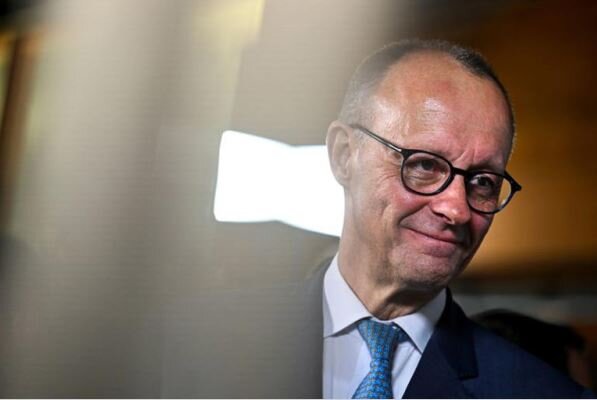Merz faces hard road to government after German election win

German conservatives under Friedrich Merz vowed on Monday to quickly form a government after winning a national election but face tricky coalition talks and the prospect of an obstructive parliament after far-right and far-left parties surged.
Time is pressing for Europe's ailing largest economy, with Germans divided over migration, its security caught between a confrontational US and an assertive Russia and China, and businesses demanding help to remain globally competitive, Reuters reported.
The most likely outcome of the election is a coalition of Merz's conservative bloc and Olaf Scholz's Social Democrats (SPD), who came in third, after the far-right Alternative for Germany (AfD) surged to a historic second place.
The AfD and the radical Left party jointly secured one third of seats in the new parliament, enough to block constitutional changes needed to loosen state borrowing limits - changes that some economists say are essential to revive economic growth.
Likely chancellor Merz is expected to seek an alliance with the SPD after a bruising campaign that highlighted deep policy divisions, in particular over migration. The SPD, smarting from its worst post-war result, may set a high price for any deal.
Merz has signaled some willingness to reform the debt brake, a constitutionally enshrined limit on state borrowing.
"From our point of view, (talks) can start very, very quickly," said Jens Spahn, a senior member of Merz's center-right Christian Democrats (CDU).
"The first talks should certainly be held this week, in the next few days. We see the situation in the world, Ukraine, Russia, the United States," he said. "German leadership is needed."
Merz, who has no previous experience in office, has said he aims to have a government in place by Easter.
Sunday's snap election followed the collapse of Scholz's three-way alliance with the Greens and pro-business Free Democrats (FDP).
In an early indication of his policy intentions, Merz took aim at the US after his win, criticizing on Sunday what he called "outrageous" comments from Washington during the campaign, comparing them to hostile interventions from Russia.
"For me, the absolute priority will be to strengthen Europe as quickly as possible so that we can achieve real independence from the US step by step," Merz said on Sunday.
His conservative CDU/CSU bloc came in first place on 28.5%, while the AfD won 20.8%, its best ever result, according to provisional results.
Mainstream parties, however, rule out working with the AfD, a party which is monitored by German security services on suspicion of extremism but has been endorsed by US figures including billionaire Elon Musk.
A resurgent Left party and the AfD may wield a blocking minority in parliament that could stymie any increase in defense spending needed to shore up European security. Both the AfD and the Left oppose military aid to Ukraine.
Holger Schmieding, chief economist at Berenberg, said Germany may struggle to raise spending on defense while also easing the tax burden for workers and firms.
"A failure to ramp up military spending could get Germany into deep trouble with its NATO partners," Schmieding said. "By infuriating US President Donald Trump, it could also add to the risk of a US-EU trade war."
Tough talks ahead
Coalition talks will not be easy and the SPD, which scored just 16.4%, has warned that its participation in a Merz-led coalition is not automatic.
In the election campaign, Merz promised a radical crackdown on immigration, saying he would not compromise on the issue.
He drew sharp SPD criticism for pushing a parliamentary resolution on migration last month with support from the AfD.
The move was seen by critics as an unforgivable breach of a political quarantine to keep the AfD out of power. SPD politicians said they could no longer trust Merz as a result.
However, the SPD on Monday indicated it was open to talks.
"If we can find a good basis together, the SPD will be prepared to hold talks because at the end of the day we have to be effective in Germany and we can't just lick our wounds now," said Anke Rehlinger, SPD premier of the state of Saarland.
Analysts say the pressure is on for the next coalition to come together quickly to provide more leadership to hold its own against US President Donald Trump, and to fend off the AfD by showing that mainstream parties can address voters' concerns.
If it does not, then the 12-year-old AfD, which is set to be the largest opposition party in the Bundestag, could be a frontrunner for the next elections set for 2029.
European diplomats are hopeful the next German government will provide more leadership and coordinate better with other capitals than Scholz's outgoing three-party coalition.
Those three parties lost a combined 19.5 percentage points compared with the 2021 election while the AfD and far-left parties together gained around 19.3 percentage points.
Leave a Comment